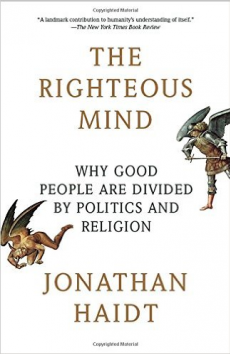
Email: reecejordan98@hotmail.co.uk
Total Article : 168
About Me:18-year-old sixth form student, studying English Literature, History and Government and Politics. My articles will broadly cover topics from the current affairs of politics to reviews of books and albums, as well as adding my own creative pieces, whether it be short fiction or general opinion.

The other major achievement that shines through the book is Haidt’s attention to, and glorification of, group mechanisms and working within groups. When touching on this subject, Haidt returns to a period of academic contention – whether humans behave as they do because of group or individual survival. This argument has since been compartmentalised, with the likes of Richard Dawkins making the assertion that whilst humans may seem to act for the good of the group, the impetus for this is wholly selfish (see Dawkins’s ‘The Selfish Gene’ for a more in-depth analysis of this argument). However, Haidt wishes to rekindle the argument and offers the contrary assertion that whilst it is true that humans do have a base level of selfishness, we are ‘90% chimpanzee and 10% bee’, i.e. that we do have a part within us that is selfless and for the good of the group. Haidt calls this the ‘Hive Switch’, and calls on pieces of literature in which people describe having a transcendental moment, which shredded their own sense of self-worth and was wholly dependent on that of the group. The main source for the evidence of this ‘Hive Switch’ is soldiers at war, and the abundance of men who claimed a disregard of their own life and an exaltation of the survival of their comrades. In a more modern sense, the perfect display of this ‘Hive Switch’ would be the abundance of team sports that are played. As a rugby player, I could very much empathise with what Haidt was saying. There is a definite ‘switch’, an odd strangeness that comes over you that surpasses all self-interest. You need only look on Youtube to see the type of injuries that some players still carry on playing with. Their reasoning for pretty much all of them is that ‘I didn’t want to let my team down’.
However, there is one major flaw within Haidt’s book. In an attempt to paint too grand a picture of religion, he mistakenly conflates positive effects of religion with regards to the evolutionary survival of particular groups and religion as a positive of today. He confronts the New Atheists in their ‘over-rationalisation’ of religious arguments. However, in attacking their position Haidt comes across as too flimsy, rarely going into detail with any of their arguments to the point where one questions whether he has fully read any of their works. It’s easy to see why religion can be seen as a good thing for the evolution of the human species, but that doesn’t mitigate its complete disregard of truth, science and rationality in modern society.
Image Credits: amazon.co.uk

0 Comment:
Be the first one to comment on this article.